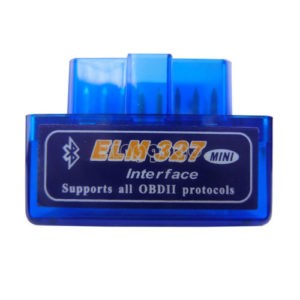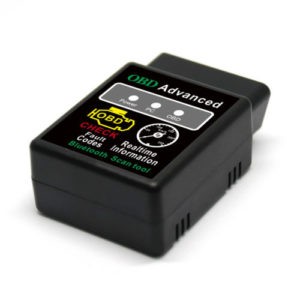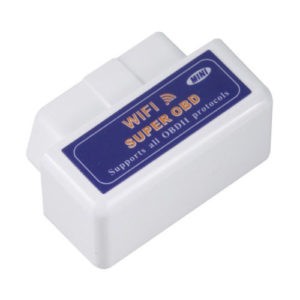The Best Obd2 Bluetooth Adapters provide seamless diagnostics for your Mercedes-Benz, enhancing your ability to monitor vehicle health and performance; MERCEDES-DIAGNOSTIC-TOOL.EDU.VN offers expert insights into selecting the right adapter, ensuring optimal compatibility and functionality. Choosing a high-quality adapter, such as those with Bluetooth LE, can improve data transfer speed, real-time diagnostics, and unlock hidden features.
Contents
- 1. Understanding OBD2 Bluetooth Adapters
- 1.1. What is an OBD2 Port?
- 1.2. Why Use a Bluetooth Adapter?
- 1.3. Key Features to Look For
- 2. Types of OBD2 Bluetooth Adapters
- 2.1. Standard Bluetooth Adapters
- Advantages:
- Disadvantages:
- 2.2. Bluetooth LE (Low Energy) Adapters
- Advantages:
- Disadvantages:
- 2.3. Bluetooth MFi Adapters
- Advantages:
- Disadvantages:
- 2.4. Wi-Fi Adapters
- Advantages:
- Disadvantages:
- 3. Top OBD2 Bluetooth Adapters for Mercedes-Benz
- 3.1. OBDLink MX+
- Key Features:
- Why it’s recommended:
- 3.2. OBDLink CX
- Key Features:
- Why it’s recommended:
- 3.3. vLinker MC+
- Key Features:
- Why it’s recommended:
- 3.4. Vgate iCar Pro 2S
- Key Features:
- Why it’s recommended:
- 3.5. Veepeak OBDCheck BLE
- Key Features:
- Why it’s recommended:
- 4. How to Choose the Right Adapter for Your Mercedes-Benz
- 4.1. Consider Your Operating System
- 4.2. Determine Your Diagnostic Needs
- 4.3. Set a Budget
- 4.4. Read User Reviews
- 5. Setting Up and Using Your OBD2 Bluetooth Adapter
- 5.1. Connecting the Adapter
- 5.2. Pairing with Your Device
- 5.3. Using Diagnostic Apps
- 6. Recommended Diagnostic Apps for Mercedes-Benz
- 6.1. Car Scanner ELM OBD2
- Key Features:
- 6.2. Torque Pro
- Key Features:
- 6.3. Bimmercode
- Key Features:
- 6.4. Dr. Prius/Dr. Hybrid
- Key Features:
- 7. Common Issues and Troubleshooting
- 7.1. Adapter Not Connecting
- 7.2. App Not Recognizing Adapter
- 7.3. Inaccurate Data
- 7.4. Adapter Freezing or Crashing
- 8. The Risks of Using Low-Quality Adapters
- 9. Maintaining Your Mercedes-Benz with OBD2 Adapters
- 9.1. Regular Check-Ups
- 9.2. Monitoring Performance
- 9.3. Clearing Trouble Codes
- 9.4. Unlocking Hidden Features
- 10. The Future of OBD2 Technology
- 10.1. Cloud-Based Diagnostics
- 10.2. AI-Powered Diagnostics
- 10.3. Enhanced Security
- 11. Expert Opinions on OBD2 Adapters
- 12. FAQs About OBD2 Bluetooth Adapters
- 12.1. What is the best OBD2 Bluetooth adapter for Mercedes-Benz?
- 12.2. How do I choose the right OBD2 adapter for my car?
- 12.3. Are cheap OBD2 adapters worth it?
- 12.4. Can an OBD2 adapter drain my car’s battery?
- 12.5. Is it safe to leave an OBD2 adapter plugged in?
- 12.6. What is the difference between OBD2 and OBD1?
- 12.7. Can I use an OBD2 adapter on multiple cars?
- 12.8. What is the range of an OBD2 Bluetooth adapter?
- 12.9. Do I need to update the firmware on my OBD2 adapter?
- 12.10. Can an OBD2 adapter unlock hidden features on my Mercedes-Benz?
- 13. Conclusion
1. Understanding OBD2 Bluetooth Adapters
An OBD2 (On-Board Diagnostics II) Bluetooth adapter is a device that connects to your car’s OBD2 port and communicates wirelessly with your smartphone, tablet, or laptop via Bluetooth. This allows you to access and interpret data from your car’s engine control unit (ECU) and other systems. Choosing the right adapter ensures accurate diagnostics and helps you maintain your Mercedes-Benz.
1.1. What is an OBD2 Port?
The OBD2 port is a standardized interface found in most vehicles manufactured after 1996. It allows mechanics and car owners to access diagnostic information and monitor vehicle performance.
1.2. Why Use a Bluetooth Adapter?
Bluetooth adapters offer several advantages over traditional wired scanners, including:
- Convenience: Wireless connectivity allows you to move freely around the vehicle.
- Real-time Data: Monitor live data streams and performance metrics.
- Cost-Effective: Often more affordable than professional diagnostic tools.
- User-Friendly: Easy to use with smartphone apps and software.
1.3. Key Features to Look For
When selecting an OBD2 Bluetooth adapter, consider the following features:
- Compatibility: Ensure the adapter is compatible with your Mercedes-Benz model and year.
- Bluetooth Version: Opt for Bluetooth 4.0 (LE) or higher for faster and more reliable connections.
- Supported Protocols: Check if the adapter supports the necessary OBD2 protocols (e.g., CAN, ISO, PWM).
- Software Compatibility: Verify that the adapter works with your preferred diagnostic apps.
- Security: Look for adapters with secure Bluetooth pairing and data encryption.
2. Types of OBD2 Bluetooth Adapters
OBD2 Bluetooth adapters come in various types, each with its own set of advantages and disadvantages. Understanding these differences can help you make an informed decision.
2.1. Standard Bluetooth Adapters
These adapters use classic Bluetooth (versions 1.x, 2.x, 3.x) and are compatible with Android devices. They offer reliable connectivity and are generally more affordable.
Advantages:
- Wide compatibility with Android devices.
- Generally lower cost.
Disadvantages:
- Not compatible with iOS devices (iPhone/iPad).
- May be slower than Bluetooth LE adapters.
2.2. Bluetooth LE (Low Energy) Adapters
Bluetooth LE adapters (version 4.0 and above) are designed for low power consumption and are compatible with both iOS and Android devices.
Advantages:
- Compatible with iOS and Android devices.
- Energy-efficient.
Disadvantages:
- Can be slower than classic Bluetooth adapters on some Android devices.
- May be slightly more expensive.
2.3. Bluetooth MFi Adapters
These adapters are specifically designed for Apple devices and require certification under Apple’s Made for iPhone/iPad (MFi) program.
Advantages:
- Guaranteed compatibility with iOS devices.
- Optimized performance on Apple devices.
Disadvantages:
- Generally more expensive.
- May not offer significant advantages over Bluetooth LE adapters for most users.
2.4. Wi-Fi Adapters
Wi-Fi adapters connect to your device via a Wi-Fi network. While they are compatible with both iOS and Android, they can be less reliable and may interfere with your mobile internet connection.
Advantages:
- Compatible with iOS and Android devices.
Disadvantages:
- Less reliable than Bluetooth adapters.
- May interfere with mobile internet connectivity.
3. Top OBD2 Bluetooth Adapters for Mercedes-Benz
Based on performance, reliability, and user reviews, here are some of the best OBD2 Bluetooth adapters for Mercedes-Benz vehicles:
3.1. OBDLink MX+
The OBDLink MX+ is a high-end adapter known for its exceptional performance and compatibility. It supports both Bluetooth MFi and Bluetooth LE, making it suitable for iOS and Android devices.
Key Features:
- Supports all OBD2 protocols.
- Advanced diagnostic capabilities.
- Secure Bluetooth connectivity.
- Compatible with a wide range of vehicles.
- Large memory buffer for excellent performance.
Why it’s recommended:
- Offers advanced features for in-depth diagnostics.
- Reliable and fast data transfer.
- Compatible with both iOS and Android.
3.2. OBDLink CX
The OBDLink CX is another excellent adapter from OBDLink, designed for use with Bimmercode and other coding apps. It offers a large memory buffer and excellent performance.
Key Features:
- Bluetooth LE connectivity.
- Large memory buffer.
- Excellent performance with coding apps.
- Compatible with iOS and Android.
Why it’s recommended:
- Ideal for users who want to code and customize their Mercedes-Benz.
- Reliable and fast data transfer.
3.3. vLinker MC+
The vLinker MC+ is a versatile adapter that supports both Bluetooth LE and Bluetooth MFi. It offers excellent performance and is compatible with a wide range of vehicles.
Key Features:
- Bluetooth LE connectivity.
- Supports all OBD2 protocols.
- Firmware updates available.
- Compatible with iOS and Android.
Why it’s recommended:
- Offers a good balance of performance and affordability.
- Reliable and easy to use.
3.4. Vgate iCar Pro 2S
The Vgate iCar Pro 2S is a popular adapter known for its compatibility and ease of use. It supports both Bluetooth 2.0 and Bluetooth 4.0, making it suitable for iOS, Android, and Windows devices.
Key Features:
- Supports all OBD2 protocols.
- Compact and durable design.
- Easy to set up and use.
- Compatible with iOS, Android, and Windows.
Why it’s recommended:
- Offers broad compatibility across different operating systems.
- Reliable and affordable.
3.5. Veepeak OBDCheck BLE
The Veepeak OBDCheck BLE is a budget-friendly option that offers decent performance and compatibility. It supports Bluetooth LE and is compatible with iOS and Android devices.
Key Features:
- Bluetooth LE connectivity.
- Supports all OBD2 protocols.
- Affordable price.
- Compatible with iOS and Android.
Why it’s recommended:
- A good option for users on a tight budget.
- Provides basic diagnostic capabilities.
4. How to Choose the Right Adapter for Your Mercedes-Benz
Selecting the right OBD2 Bluetooth adapter for your Mercedes-Benz depends on several factors, including your budget, technical expertise, and specific diagnostic needs.
4.1. Consider Your Operating System
- iOS (iPhone/iPad): Choose a Bluetooth LE or Bluetooth MFi adapter.
- Android: Choose a classic Bluetooth or Bluetooth LE adapter.
4.2. Determine Your Diagnostic Needs
- Basic Diagnostics: If you only need to read and clear trouble codes, a basic adapter like the Veepeak OBDCheck BLE may suffice.
- Advanced Diagnostics: For more in-depth diagnostics, live data monitoring, and coding, opt for a high-end adapter like the OBDLink MX+ or vLinker MC+.
4.3. Set a Budget
OBD2 Bluetooth adapters range in price from around $20 to over $100. Set a budget and choose an adapter that offers the best value for your money.
4.4. Read User Reviews
Before making a purchase, read user reviews to get an idea of the adapter’s performance, reliability, and customer support.
5. Setting Up and Using Your OBD2 Bluetooth Adapter
Once you’ve chosen the right adapter, setting it up and using it is a straightforward process.
5.1. Connecting the Adapter
- Locate the OBD2 port in your Mercedes-Benz (usually located under the dashboard on the driver’s side).
- Plug the OBD2 Bluetooth adapter into the port.
- Turn on your car’s ignition.
5.2. Pairing with Your Device
- Enable Bluetooth on your smartphone or tablet.
- Search for the OBD2 adapter in the list of available devices.
- Pair with the adapter using the default PIN code (usually 1234 or 0000).
5.3. Using Diagnostic Apps
- Download and install a compatible diagnostic app on your device (e.g., Car Scanner ELM OBD2, Torque Pro, Bimmercode).
- Launch the app and connect to the OBD2 adapter.
- Follow the app’s instructions to read trouble codes, monitor live data, and perform other diagnostic functions.
6. Recommended Diagnostic Apps for Mercedes-Benz
Several diagnostic apps are compatible with OBD2 Bluetooth adapters and offer specific features for Mercedes-Benz vehicles.
6.1. Car Scanner ELM OBD2
Car Scanner ELM OBD2 is a popular app known for its user-friendly interface and comprehensive diagnostic capabilities.
Key Features:
- Read and clear trouble codes.
- Monitor live data streams.
- Perform advanced diagnostic tests.
- Customize dashboard displays.
- Supports a wide range of vehicles.
6.2. Torque Pro
Torque Pro is a powerful app that offers advanced diagnostic features and customization options.
Key Features:
- Read and clear trouble codes.
- Monitor live data streams.
- Record and analyze data logs.
- Customize dashboard displays.
- Supports third-party plugins.
6.3. Bimmercode
Bimmercode is specifically designed for coding and customizing BMW and Mercedes-Benz vehicles.
Key Features:
- Unlock hidden features.
- Customize vehicle settings.
- Perform advanced coding functions.
- User-friendly interface.
6.4. Dr. Prius/Dr. Hybrid
While primarily designed for Toyota and Lexus hybrid vehicles, Dr. Prius/Dr. Hybrid can also be used to monitor battery health and performance on Mercedes-Benz hybrid models.
Key Features:
- Monitor battery voltage and temperature.
- Perform battery health checks.
- Read and clear hybrid-related trouble codes.
7. Common Issues and Troubleshooting
While OBD2 Bluetooth adapters are generally reliable, you may encounter some issues during setup or use. Here are some common problems and troubleshooting tips:
7.1. Adapter Not Connecting
- Check Bluetooth: Make sure Bluetooth is enabled on your device.
- Verify Compatibility: Ensure the adapter is compatible with your device’s operating system.
- Restart Device: Try restarting your smartphone or tablet.
- Reset Adapter: Some adapters have a reset button that can be used to resolve connectivity issues.
7.2. App Not Recognizing Adapter
- Check App Settings: Make sure the app is configured to use the correct Bluetooth adapter.
- Update App: Ensure you have the latest version of the diagnostic app installed.
- Reinstall App: Try uninstalling and reinstalling the app.
7.3. Inaccurate Data
- Check Adapter Quality: Low-quality adapters may provide inaccurate or unreliable data.
- Verify Vehicle Compatibility: Ensure the adapter is compatible with your Mercedes-Benz model and year.
- Update Firmware: Check for firmware updates for the adapter.
7.4. Adapter Freezing or Crashing
- Check Bluetooth Connection: A weak or unstable Bluetooth connection can cause the adapter to freeze or crash.
- Limit Background Apps: Close any unnecessary apps running in the background.
- Update Firmware: Check for firmware updates for the adapter.
8. The Risks of Using Low-Quality Adapters
Using a low-quality OBD2 Bluetooth adapter can lead to several problems, including:
- Inaccurate Data: Providing incorrect diagnostic information.
- Unreliable Connection: Frequent disconnections and connectivity issues.
- ECU Damage: In rare cases, a faulty adapter can damage your car’s ECU.
- Security Risks: Exposing your vehicle’s data to potential security breaches.
To avoid these risks, always choose a reputable adapter from a trusted brand.
9. Maintaining Your Mercedes-Benz with OBD2 Adapters
Using an OBD2 Bluetooth adapter can help you proactively maintain your Mercedes-Benz and prevent costly repairs.
9.1. Regular Check-Ups
Perform regular diagnostic scans to identify potential issues before they become major problems.
9.2. Monitoring Performance
Monitor live data streams to track your car’s performance and identify any anomalies.
9.3. Clearing Trouble Codes
Clear trouble codes after performing repairs to reset your car’s systems.
9.4. Unlocking Hidden Features
Some adapters and apps allow you to unlock hidden features and customize your car’s settings.
10. The Future of OBD2 Technology
OBD2 technology is constantly evolving, with new adapters and apps offering increasingly advanced features. Some emerging trends include:
10.1. Cloud-Based Diagnostics
Cloud-based diagnostic platforms allow you to store and analyze your car’s data in the cloud, providing valuable insights and predictive maintenance recommendations.
10.2. AI-Powered Diagnostics
AI-powered diagnostic apps can automatically identify and diagnose complex issues, reducing the need for manual troubleshooting.
10.3. Enhanced Security
Newer adapters and apps are incorporating advanced security features to protect your vehicle’s data from cyber threats.
11. Expert Opinions on OBD2 Adapters
According to a study by the Society of Automotive Engineers (SAE), the use of OBD2 scanners can reduce diagnostic time by up to 40%. This highlights the efficiency and value of using these tools for vehicle maintenance.
Furthermore, a report by the National Institute for Automotive Service Excellence (ASE) emphasizes the importance of using high-quality OBD2 adapters to ensure accurate and reliable diagnostic information.
12. FAQs About OBD2 Bluetooth Adapters
12.1. What is the best OBD2 Bluetooth adapter for Mercedes-Benz?
The best OBD2 Bluetooth adapter for your Mercedes-Benz depends on your specific needs and budget. High-end options like the OBDLink MX+ offer advanced features and reliable performance, while budget-friendly options like the Veepeak OBDCheck BLE provide basic diagnostic capabilities.
12.2. How do I choose the right OBD2 adapter for my car?
Consider your operating system (iOS or Android), diagnostic needs (basic or advanced), and budget when choosing an OBD2 adapter. Read user reviews and check compatibility with your vehicle model and year.
12.3. Are cheap OBD2 adapters worth it?
Cheap OBD2 adapters may be tempting, but they often lack reliability and accuracy. Investing in a reputable adapter from a trusted brand is generally worth the extra cost.
12.4. Can an OBD2 adapter drain my car’s battery?
Some OBD2 adapters can drain your car’s battery if left plugged in for extended periods. Choose an adapter with low power consumption or unplug it when not in use.
12.5. Is it safe to leave an OBD2 adapter plugged in?
It is generally safe to leave an OBD2 adapter plugged in, but it’s recommended to unplug it when not in use to prevent battery drain and potential security risks.
12.6. What is the difference between OBD2 and OBD1?
OBD2 is a standardized diagnostic system introduced in 1996, while OBD1 is an older, non-standardized system used in vehicles manufactured before 1996.
12.7. Can I use an OBD2 adapter on multiple cars?
Yes, you can use an OBD2 adapter on multiple cars, as long as they are OBD2-compliant (manufactured after 1996).
12.8. What is the range of an OBD2 Bluetooth adapter?
The range of an OBD2 Bluetooth adapter is typically around 30 feet (10 meters).
12.9. Do I need to update the firmware on my OBD2 adapter?
Yes, it’s recommended to update the firmware on your OBD2 adapter to ensure optimal performance and compatibility.
12.10. Can an OBD2 adapter unlock hidden features on my Mercedes-Benz?
Some OBD2 adapters and apps, like Bimmercode, allow you to unlock hidden features and customize your car’s settings.
13. Conclusion
Choosing the best OBD2 Bluetooth adapter for your Mercedes-Benz can greatly enhance your ability to monitor and maintain your vehicle. By considering factors such as compatibility, features, and budget, you can find an adapter that meets your specific needs. Remember to use reputable diagnostic apps and follow recommended troubleshooting steps to ensure accurate and reliable results. With the right tools and knowledge, you can keep your Mercedes-Benz running smoothly for years to come.
For personalized advice and assistance in selecting the perfect OBD2 Bluetooth adapter for your Mercedes-Benz, contact us at MERCEDES-DIAGNOSTIC-TOOL.EDU.VN. Our experts are here to help you unlock the full potential of your vehicle. Visit us at 789 Oak Avenue, Miami, FL 33101, United States or reach out via WhatsApp at +1 (641) 206-8880. Let us help you drive with confidence.
 Mercedes-Benz Diagnostic Tool
Mercedes-Benz Diagnostic Tool
 OBD2 Bluetooth Adapters
OBD2 Bluetooth Adapters
 Mercedes Vehicle Diagnostic
Mercedes Vehicle Diagnostic
 Bluetooth OBD2 Device
Bluetooth OBD2 Device
